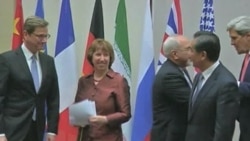The hard work that led to a temporary agreement limiting Iran's nuclear program will likely lead to more difficult talks on a permanent deal. The interim accord is being debated - and criticized - in the United States and Israel.
The nuclear agreement with Iran is supported by Americans two-to-one, according to a public opinion poll.
But Israeli Prime Minister Benjamin Netanyahu called it a "historic mistake."
"So, Israel is not bound by this agreement. We cannot and will not allow a regime that calls for the destruction of Israel to obtain the means to achieve this goal. We will not allow Iran to have a nuclear weapons capability," said Netanyahu.
The interim agreement requires Iran to stop enriching uranium at current levels, freeze further work on centrifuges, and halt major activity at the Arak reactor, designed to produce plutonium.
The agreement also suspends some U.S. and EU economic sanctions and prohibits new ones for the life of the 6-month deal.
Reaction in Congress has been mixed. Some Democrats, and many Republicans, like Senator Lindsey Graham, say it's a bad deal.
"This deal doesn't require them to shut down the plutonium reactor. This deal doesn't require them to dismantle their ability to enrich uranium, that could lead to a nuclear weapon. It gives them $7 billion. They get the cash, and we really don't get much," said Graham.
However, the remaining sanctions will outweigh sanctions relief, according to Daryl Kimball, executive director of Washington's independent Arms Control Association.
"The sanctions relief that Iran will be getting through the course of the six-month agreement is worth less than $10 billion. Meanwhile, there will be an additional $15-20 billion in Iranian assets that are frozen during the duration of this agreement," said Kimball.
And Iran will not be able to expand oil exports.
If a permanent agreement is not reached within six months, Kimball says the first stage could be extended, or Congress could vote to impose additional sanctions against Iran.
Economic sanctions are working and should be tightened, not eased, says Republican Senator Saxby Chambliss.
"We've trusted the Iranians before, just like the North Koreans, on nuclear issues, and what have we gotten for it?" asked Chambliss.
Further sanctions would be counterproductive, says Daryll Kimball.
"That would be a direct violation of the agreement, and the Iranians have said that they will not carry out their steps, the constraints on their program that they have agreed to," he said.
So, while negotiators work toward a comprehensive deal, officials in the U.S. will continue to debate the merits of the interim accord.
The nuclear agreement with Iran is supported by Americans two-to-one, according to a public opinion poll.
But Israeli Prime Minister Benjamin Netanyahu called it a "historic mistake."
"So, Israel is not bound by this agreement. We cannot and will not allow a regime that calls for the destruction of Israel to obtain the means to achieve this goal. We will not allow Iran to have a nuclear weapons capability," said Netanyahu.
The interim agreement requires Iran to stop enriching uranium at current levels, freeze further work on centrifuges, and halt major activity at the Arak reactor, designed to produce plutonium.
The agreement also suspends some U.S. and EU economic sanctions and prohibits new ones for the life of the 6-month deal.
Reaction in Congress has been mixed. Some Democrats, and many Republicans, like Senator Lindsey Graham, say it's a bad deal.
"This deal doesn't require them to shut down the plutonium reactor. This deal doesn't require them to dismantle their ability to enrich uranium, that could lead to a nuclear weapon. It gives them $7 billion. They get the cash, and we really don't get much," said Graham.
However, the remaining sanctions will outweigh sanctions relief, according to Daryl Kimball, executive director of Washington's independent Arms Control Association.
"The sanctions relief that Iran will be getting through the course of the six-month agreement is worth less than $10 billion. Meanwhile, there will be an additional $15-20 billion in Iranian assets that are frozen during the duration of this agreement," said Kimball.
And Iran will not be able to expand oil exports.
If a permanent agreement is not reached within six months, Kimball says the first stage could be extended, or Congress could vote to impose additional sanctions against Iran.
Economic sanctions are working and should be tightened, not eased, says Republican Senator Saxby Chambliss.
"We've trusted the Iranians before, just like the North Koreans, on nuclear issues, and what have we gotten for it?" asked Chambliss.
Further sanctions would be counterproductive, says Daryll Kimball.
"That would be a direct violation of the agreement, and the Iranians have said that they will not carry out their steps, the constraints on their program that they have agreed to," he said.
So, while negotiators work toward a comprehensive deal, officials in the U.S. will continue to debate the merits of the interim accord.





